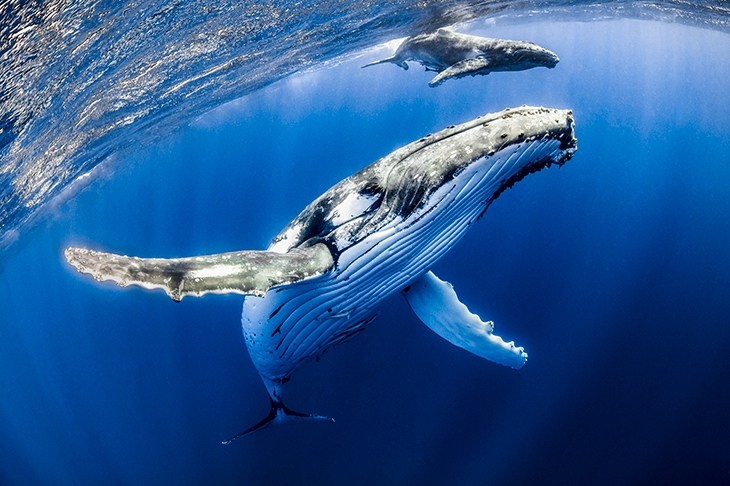A few years ago I was sitting in Carl Safina’s yard on Long Island, drinking tea, occasionally patting a dog who was lying at my feet. Safina was talking about the magnanimity of wolves. A wolf in Yellowstone National Park, known as Twenty-One, never lost a fight, and unlike most wolves, never killed a vanquished opponent. Park rangers called him the perfect wolf.
‘When a human releases a vanquished opponent rather than killing them, in the eyes of onlookers the vanquished still loses status but the victor seems all the more impressive,’ Safina said. ‘Onlookers might feel it would be desirable to follow such a person, so strong yet inclined towards forbearance.’
Safina is not some woo-woo merchant, or a new-world mist-dweller. He does proper science. He is the first endowed professor for nature and humanity at Stony Brook University, New York, and he has just published Becoming Wild: How Animals Learn to Be Animals. It’s mostly about culture. No, not animals in human culture: culture in non-human animals.
Here’s an example: humpback whales all sing the same song, but only when they live in the same ocean; there are different songs for different oceans… and every year all the songs change. And a more homely one: blue tits learned to take cream from milk bottles left on doorsteps, and the knowledge swept across Britain. Now the milk and the bottles and the buying habits are all different and that aspect of culture is defunct.
Safina’s book is based around three extended visits to wildlife field projects, and takes us to startling depths of intimacy with sperm whales, scarlet macaws and chimpanzees. Sperm whales use different sequences of sounds to announce their identity to each other, as individuals and as members of a clan — yes, a bit like names. You can’t release a rescued macaw into the wild: each one needs education in the skills of being wild, skills they would normally learn from parents. Chimpanzees have different tool-using and hunting traditions from one population to another.

I was taught at school that animals have instinct but humans have learning. Later that got more refined: animals can only ever pass on things through their genes, but we humans can pass things on by example and by teaching — in short, by culture. Culture is why we’re humans and they’re not.
But like all adamantine barriers we have drawn up between human and non-human life, even the most cursory examination reveals a million leaks and porosities. Of course non-human animals have culture.
More examples: in times of exceptional drought, elephant groups led by an old matriarch find water, while those with a young leader don’t. The knowledge is cultural. Bottlenose dolphins in Shark Bay, Australia — but nowhere else — use sponges to protect their noses when bottom feeding; mothers show young ones how it’s done. Travel a decent distance and birds of the same species sing slightly different songs: different dialects, in short.
That’s also the right category for what Safina called the ‘silly debate’ about nature and nurture: obviously both are relevant, for humans and for everybody else. ‘Whales can learn but they can’t learn French. Humans can sing, but not like a humpback.’
I have watched lions learning. Cubs learn to hunt in games of pounce and chase. I have seen adults initiate play, certainly for the fun of it, but they are also teaching.
In times of drought, elephant groups led by an old matriarch find water, while those with a young leader don’t
Ludwig Wittgenstein famously said that if a lion could talk we wouldn’t be able to understand him. I have spent a fair bit of time with lions and I reckon I could have a pretty decent conversation with, say, the alpha female of the pride I visited in the Luangwa Valley last year. We could discuss hunting, the weather, her companions, the squabbles, the neighbouring prides, the new cubs and the wonderful feast the whole pride shared the previous night.
Safina and I talked about the theory of mind. ‘Basically it’s the idea that a creature has a mind that is capable of knowing that another creature has a mind and that their agenda may be different to your agenda,’ he said. ‘It’s been claimed for decades that only humans have theory of mind, but it’s been argued for the last 25 that other animals may also have it.’ He gave the example of his dogs and a stand-off with a swan in which all parties understood each other’s position.
Why are we so resistant to the idea of common ground between humans and non-human animals? After all, we share getting on for 98 per cent of our genes with chimpanzees. It’s not even as if it were a new idea: Charles Darwin said: ‘The difference between man and the higher animals, great as it is, certainly is one of degree and not of kind.’
Safina suggests that we have all ‘inhaled’ the scala naturae: the notion of the hierarchy of life. Rocks are at the bottom, then plants, then nicer plants, then animals, then ‘higher’ animals, and then at the top, quite separate, you find wonderful old us. Beyond that there can be only angels and God.
This inhaled view is why we find it surprising that whales compose songs, that chimpanzees teach young ones how to use tools and that crows in Japan place nuts on the road for cars to crack.
Safina says: ‘The basis for our surprise is our ignorance, our self-isolation, our insecurity, our need to be the best thing that happened since the stars were born. When researchers recently showed that fish… can recognise themselves in a mirror… scientific journal editors wouldn’t publish their study unless they publicly called into question the mirror test itself.’ Self-aware fish are too threatening to deal with otherwise.
Ethology — the science of animal behaviour — is pretty young, dating only to the 1950s. ‘Not assuming that other animals have thoughts and feelings was a good start for a new science,’ Safina wrote. ‘Insisting that they did not was bad science.’
The dread of seeming sentimental has forced us into some curious contortions. ‘Scientists spent decades saying “You can’t say that a dog wants to go out”,’ Safina said. Pet–owners disagree: when the dog scratches the door, you let him out for a pee.
The notion of humanity’s perfect separateness — or humanity’s separate perfectness — is philosophically untenable (unless you ignore the data). It is, however, the basis for the way we have run the world ever since running the world became an option: and it is the way we continue to run it — to our accelerating impoverishment. If we really need a trait of genuine uniqueness for humans, we can at least lay claim to this. Ecocide.






Comments